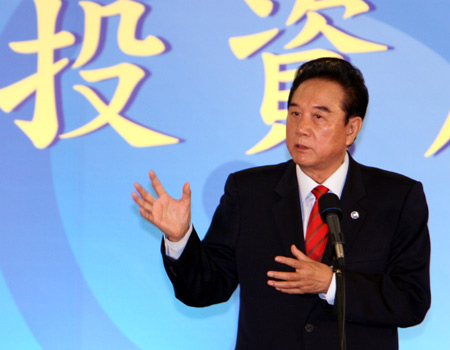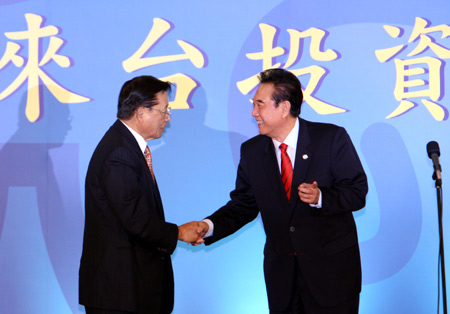TAICHUNG, Dec. 23 (Xinhua) -- Letting in more mainland investors again hit the agenda in Taiwan as negotiators from two sides discussed mainland investment with local business people Wednesday.
At the symposium, Chen Yunlin, president of the mainland's Association for Relations Across the Taiwan Straits (ARATS), suggested Taiwan should not be "afraid" of competitors.

Chen Yunlin, president of the Chinese mainland's Association for Relations Across the Taiwan Straits (ARATS), speaks on a symposium on the investment of Chinese mainland to Taiwan, in Taichung of southeast China's Taiwan, Dec. 23, 2009. (Xinhua/Yuan Man)
When the mainland began to open up, the enterprises and industries also worried that they would be beaten by overseas competitors, but 30 years after, they not only survived but also became stronger, Chen said.
"High liquidity of capital, people, resources and knowledge across the Taiwan Strait will bring prosperity to both sides," he said. "The mainland's advantage in manufacturing and Taiwan's leading marketing will supplement each other. Thus, the two can form a bigger economic entity in face of global competition."
Taiwan's Straits Exchange Foundation (SEF) Chairman Chiang Pin-kun echoed Chen's remarks.

Chen Yunlin, president of the Chinese mainland's Association for Relations Across the Taiwan Straits (ARATS), shakes hands with Chairman of Taiwan's Straits Exchange Foundation (SEF) Chiang Pin-kung on a symposium on the investment of Chinese mainland to Taiwan, in Taichung of southeast China's Taiwan, Dec. 23, 2009. (Xinhua/Yuan Man)
"(The mainland's) investment will bring more employment and boost economic growth, which will benefit both sides," Chiang said.
He admitted that not many mainland investors had entered Taiwan since the island lifted the ban in June, mainly because only a limited number of sectors were opened to them.
Another reason was that mainland investors were not yet familiar with the local market and business practice, Chiang said.
By the end of November, the Taiwan authorities approved 15 investment plans from the mainland, totalling 5.82 million U.S. dollars.
"I hope the policies can be clearer, the procedures simpler and more sectors are opened to us," said Wang Jing, president of the Newland Group, a Fujian-based IT firm with a project in Taiwan.
Currently, mainland investment can go to the sectors of textile, car making, home appliance, retailing and wholesale of consumer products, air and shipping service and infrastructure for public use (not including construction contractors).
Mainland companies have to get approval from Taiwan authorities under strict regulations and the conditions are also restrictive in those accessible sectors, Wang said. "The restrictions will prevent mainland companies from enjoying fair competition."
She cited the complicated procedure that mainland businessmen had to undergo to travel to Taiwan.
"We have invested in an IT firm in Taiwan. Research work requires cooperation between staff on both sides and they have to travel a lot across the Strait. When there is an emergency, our mainland staff always could not go to Taiwan promptly," she said. "In a world of tough competition, we should not sacrifice efficiency."
Many mainland companies are interested in real estate development, finance and telecommunication that are still not on the list.
Long Ge, vice president of Shanghai Xiandai Architectural Design Group, just finished a business tour in Taiwan.
"We hope to set up an office in Taiwan in near future," Long said.
His company hoped to launch real estate businesses, not only design but also construction and marketing, in Taiwan. "But we cannot if the restrictions remain there," he said.